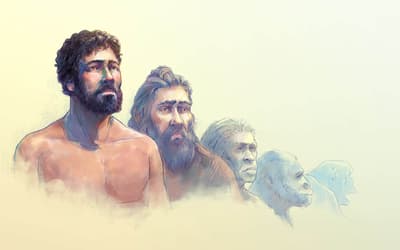The views expressed in this paper are those of the writer(s) and are not necessarily those of the ARJ Editor or Answers in Genesis.
Abstract
The problem of establishing an ontological basis for morality has troubled materialistic philosophers since Darwin. This paper demonstrates that three attempts to explain the derivation of human moral norms within a naturalistic paradigm are inadequate. First, it examines Stuart Kauffman’s attempt to derive morality from monkeys. Second, it examines Ayn Rand’s Ethical Egoism. Third, it examines the evolutionary behaviorism model proposed by B.F. Skinner and held by numerous others.
Keywords: evolutionary ethics, egoism, emergence, behaviorism, is-ought problem, moral argument, naturalistic fallacy, altruism, determinism, materialism, falsifiability criterion
Atheists widely celebrate David Hume, darling of the Scottish Enlightenment, for his skeptical argument against miracles, particularly the resurrection.1 But Hume, like most Enlightenment philosophers, probably never embraced atheism.2 Hume criticized both Roman Catholicism and Protestant sectarianism, but never completely abandoned belief in God as did his French Enlightenment counterpart, Paul-Henri Thiry, Baron d’Holbach. Hume’s position was essentially “irreligion.”3
The problem that kept Hume from embracing a complete materialism has been called “Hume’s Guillotine,” the “is-ought problem” or the “naturalistic fallacy.”4 The problem concerns establishing an ontological basis for prescribing moral behaviors rather than merely describing natural behaviors. On what basis does a father insist that his son ought to obey his command; whereas, the father does not insist that the family pet ought to obey? Animal behavior is describable in naturalistic terms; “this is how animals behave.” However, human behavior can be prescribed in moral terms; “this is how humans ought to behave.”
Hume’s Guillotine is set forth unambiguously in a brief passage in his A Treatise of Human Nature (1949).
In every system of morality, which I have hitherto met with, I have always remarked, that the author proceeds for some time in the ordinary ways of reasoning, and establishes the being of a God, or makes observations concerning human affairs; when all of a sudden I am surprised to find, that instead of the usual copulations of propositions, is, and is not, I meet with no proposition that is not connected with an ought, or an ought not. This change is imperceptible; but is however, of the last consequence. For as this ought, or ought not, expresses some new relation or affirmation, ‘tis necessary that it should be observed and explained; and at the same time that a reason should be given; for what seems altogether inconceivable, how this new relation can be a deduction from others, which are entirely different from it. But as authors do not commonly use this precaution, I shall presume to recommend it to the readers; and am persuaded, that this small attention would subvert all the vulgar systems of morality, and let us see, that the distinction of vice and virtue is not founded merely on the relations of objects, nor is perceived by reason. (Hume 1949, pp. 177–178)
Hume questions whether even God himself establishes a sufficient basis for deriving “ought” from an “is.” But there is no difficulty here for the theist who begins with a personal rather than an impersonal basis of reality.5 The naturalistic fallacy only occurs when a person seeks to derive an ethical imperative from an impersonal or material source.6 One cannot say “murder is wrong since humans derive from nature.” One can say “murder is wrong since humans are created by a personal God who prohibits the practice of murder.”7
This paper will demonstrate the incoherency of several attempts to establish an ontological basis for morality within a materialistic framework. It is a defense of the moral argument for God’s existence, but only in the negative sense that it eliminates materialism as an option for establishing moral norms. It will address whether human morals are derivative from animals. It then examines whether evolutionary ethical egoism is a legitimate option. It then demonstrates the inconsistencies in a behavioristic approach to ethics. Finally, using Karl Popper’s falsifiability criterion, the paper demonstrates that evolutionary explanations for the origin of morality can hardly be called “scientific.”
Stuart Kauffman’s Monkey Theorem
Stuart Kauffman, a contemporary biologist, boldly challenges traditional Christian views in his book Reinventing the Sacred (2008). He asserts the time has come to redirect our feelings of awe and reverence away from God and toward nature. The cell, he claims, is worthy of greater awe than God.
Consider the woven integrated complexity of a living cell after 3.8 billion years of evolution. Is it more awesome to suppose that a transcendent God fashioned the cell at a stroke, or to realize the truth: that the living cell evolved with no Creator, no Almighty Hand, but arose on its own . . . . The truth is much more magnificent, much more worth of awe and wonder, than our ancient creation myths. (Kauffman 2008, back cover)8
Likewise, Kauffman argues, Western civilization can abandon its dependence on traditional theism to ground its moral norms.
Many of us cling to the belief that without a Creator God, morality would crumble. Indeed, much of the resistance to evolution as fact and science is the fear that without God to create the universe and to author moral law, Western civilization itself would crumble. I empathize with this fear, but it is not well placed. (Kauffman 2008, p. 260)
In an opaque paragraph, Kauffman acknowledges Hume’s “ought” question, but dismisses it summarily with an appeal to the notion of evolutionary “emergence.”
From the natural selective emergence of agency and values, hence “ought,” and further natural evolution of higher social primates, we may understand how the rudiments of human morality evolved. We do not need a Creator God to author our morals. Our “moral sentiments” are partially evolved and partially derived from the histories of our civilizations . . . . Evolution is not the enemy of ethics but its first source. (Kauffman 2008, p. 260)
Kauffman uses the term “emergence” to explain that biological entities are more than the sum of their individual parts. Humans are more than the collection of atoms, cells, and tissue that make up their bodies. Kauffman rejects the kind of materialistic reductionism that has dominated science since Galileo.9 When functioning collectively, material properties can produce agency and value. Raised to the level of complex biological organisms, emergence explains why moral thinking begins to appear in the animals and continues to develop in hominids through to the complex ethical systems developed by human civilizations.
After establishing his doctrine of emergence, Kauffman turns to evolution for a demonstration of how moral norms evolved. His entire argument builds on an experiment featuring Capuchin monkeys.
A wonderful experiment was carried out with Capuchin monkeys. The experiment consists of two monkeys in two cages facing one another but separated by a partition so neither can see the other. Adjacent to these two cages is a third cage in which a third monkey can observe both of the other two. The experimenter feeds one of these two apples, bananas, and so forth. The second monkey receives scraps. At some point, the observer monkey, well fed itself, is given extra food. What does this animal do? It gives the extra food to the monkey who received the scraps. These monkeys have evolved a sense of fairness. (Kauffman 2008, p. 260, emphasis added)
Kauffman’s monkey analogy is clever but fails at three points to offer an adequate explanation of the origin of moral norms. First, Kauffman uses the gloss “emergence” in precisely the way Hume decried. The real question is how are humans (or monkeys) more than the sum of their individual material parts? It does not follow that a collection of material parts can obey a moral ought any more than an individual material part can. Merely recognizing the problem with materialistic reductionism does not offer a solution to the ontological source of agency and value.
Second, to solve the problem of materialistic reductionism, Kauffman turns to the equally problematic notion of “group selection” (Kauffman 2008, p. 261). Kauffman acknowledges that evolutionary “natural selection” could not produce the sense of fairness seen in the Capuchin monkeys. “Natural selection acts only at the level of the individual organism, favoring those with more offspring, why should natural selection evolve organisms that show altruism for nonrelatives, such as the Capuchin monkeys above?” (Kauffman 2008, p. 261). So Kauffman turns to “group selection” claiming “it might arise that genes favoring altruism to nonrelatives in one group would give that group as a whole a selective advantage in propagating compared to groups not having the ‘altruism’ genes” (Kauffman 2008, p. 261). But here Kauffman unwittingly embraces the very reductionism he rejects when he pushes altruism down to the level of genetic predisposition. And by reducing altruism to genetic predisposition Kauffman does not overcome Hume’s fallacy. How does “ought” arise from genetic predisposition?
A third and most damaging problem for Kauffman’s monkey analogy is that he begs the question by presupposing that “fairness” is ethical. Assuming momentarily an evolutionary worldview, two questions will illustrate the fallacy. 1) Is fairness ethical simply because monkeys evolved it? 2) Or did monkeys evolve towards an ethical standard that is independent of themselves?
Surely, Kauffman cannot claim the second since that would locate ethical norms in a transcendent standard independent of nature. And this transcendent standard works only in a theistic system.
However, if Kauffman claims “fairness” is ethical because it evolved among the monkeys, this raises curious questions about the morality of other naturally evolving animal behaviors. Dominant male lions will selfishly hoard harems of females, chasing off the young males. Does this justify polygamy? Numerous species cannibalize their own; some species kill their young. Does this justify murder or infanticide? How can Kauffman select one exemplary monkey behavior—fairness— from numerous non-exemplary behaviors without presupposing standards of behavior that enable his discrimination?
Clearly, Kauffman presupposes “fairness” is ethical, and then goes looking for an example to support his conclusion. But if evolution is the source of our moral norms he cannot appeal to a standard external to evolution to discriminate between naturally evolving behaviors. Randy Thornhill and Craig Palmer’s book, A Natural History of Rape (2000) defends rape as a normal reproductive strategy developed to guarantee the survival of one’s genes. Few evolutionists will sympathize with their thesis. But how can an evolutionist condemn the evolution of rape and condone the evolution of fairness without presupposing an ontologically transcendent standard of behavior? Ironically, Kauffman concedes the insufficiency of his arguments when he admits, “Still, ethical and moral reasoning goes far beyond what can be accounted for by evolutionary arguments” (Kauffman 2008, p. 262).
Kauffman’s attempt to locate the origin of moral norms among the animals is mirrored in numerous other works. World-famous primatologist Frans de Waal in his recent work, The Bonobo and the Atheist (2013), presents a nearly identical argument. “I am not convinced that morality needs to get its weight from above . . . . The whole point of my book is to argue a bottom up approach” (de Waal 2013, pp. 17, 23). Like Kauffman, de Waal assumes that merely locating moral behaviors among the animals sufficiently justifies the “bottom up” approach. De Waal adds to Kauffman’s argument the notion that since morality predates organized religion on the planet (assuming an evolutionary worldview), morality was not authored by God (de Waal 2013, p. 3).10 This is a non sequitur; no theist argues that morality began with the advent of revealed religion. The moral law was “written on the heart” long before it was “written in stone.” The theist argues that God, as the author of morality, predates the origin of animals, humans, and organized religion.
Richard Dawkins, in his best-selling The God Delusion, explains the origin of altruism in much the same way that Kauffman explains the origin of fairness. Without any scientific justification, he asserts, “genes ensure their own selfish survival by influencing organisms to behave altruistically.” Genes favoring altruism “can increase in the gene pool to the point where kin altruism becomes the norm.” Dawkins identifies several species, including meerkats and woodpeckers which, he claims, “have evolved societies in which elder siblings care for younger siblings” (Dawkins 2006b, p. 216).
Like Kauffman, Dawkins presupposes the morality of altruism and goes looking to the animal kingdom for an example. But against which standard of morality is Dawkins judging animal behavior?
Further, on what basis can Dawkins suggest humans ought to duplicate animal altruism if altruism is genetically determined? Interestingly, Dawkins elsewhere questions whether evolution can even produce altruistic behavior. In an earlier work he admits the altruistic practice of blood donation is difficult to reconcile with evolution. “Maybe I am naïve, but I find myself tempted to see it [blood donation] as a genuine case of pure, disinterested altruism” (Dawkins 1989, p. 230). But instead of conceding that genuine altruism evolved, he claims it is merely akin to the practice of “blood-sharing in vampire bats” (Dawkins 1989, p. 231). Dawkins seems caught in a dilemma. On the one hand, he wants to believe that humans ought to engage in altruistic acts. On the other, his materialism turns “ought” into an “is,” reducing altruism to a description of genetically determined behavior.
Many evolutionists are unconvinced by the kinds of arguments offered by Kauffman and Dawkins. Biologist Ernst Mayr does not believe altruism can evolve. “Altruism toward strangers is a behavior not supported by natural selection” (Mayr 2002, p. 259). Philosopher Richard Rorty labels “the idea that every human being has a built-in moral compass” as “un-Darwinian” (Rorty 1995, p. 36). H. Allen Orr is blunt. “The ugly fact is that we haven’t a shred of evidence that morality in humans did or did not evolve by natural selection” (Orr 1996). Even Richard Dawkins, on one occasion, admitted “[there is] no evil and no good, . . . DNA neither knows nor cares. DNA just is” (Dawkins 1995, p. 133).
The search for the origin of moral norms among the primates fails to address Hume’s question and unwittingly presupposes a transcendent standard of ethics. Further, the location of apparently “moral” behaviors in animals is not as damaging to a theistically based morality as the evolutionist assumes. The theist recognizes that God creates creatures capable of performing acts that resemble human acts of fairness and altruism.
Ayn Rand’s Ethical Egoism
Russian-born playwright, philosopher, screenwriter, and novelist Ayn Rand was the leading exponent of evolutionary ethical egoism, a position that roots moral behavior in radical self-interest. In The Virtue of Selfishness, Rand defines her position. “The achievement of his own happiness is man’s highest moral purpose” (Rand 1964, p. 27). James Rachels defines egoism similarly. “Each person ought to pursue his or her own self-interest exclusively . . . . One’s ‘only’ duty is to promote one’s own interests” (Rachels 2007, pp. 69, 75). Elements of egoism appear in philosophy long before Rand, but she is the first to construct egoism on a Darwinian foundation.11
Rand’s 1959 novel Atlas Shrugged lays out an antitheistic, anti-altruistic, evolutionary, egoistic ethic. She rejects Jesus’s two great commandments to love God and love one’s neighbor, “You have been taught that morality is a code of behavior imposed on you by whim, the whim of a supernatural power or the whim of society, to serve God’s purpose or your neighbor’s welfare” (Rand quoted in Pojman 1998, p. 27).12 The root problem with Jesus’s view is altruism, “Altruism declares that any action taken for the benefit of others is good, and any action taken for one’s own benefit is evil. Thus the beneficiary of an action is the only criterion of moral value—and so long as that beneficiary is anybody other than oneself, anything goes” (Rand 1964, p. viii, italics in original). (One wonders on what basis Rand includes in altruism the false assumption that “any action taken for one’s own benefit is evil.”) To support her view, Rand turns to Darwinian evolution.
Nature does not provide man with an automatic form of survival . . . . Man’s mind is his basic tool of survival . . . . To remain alive, he must act, and before he can act he must know the purpose of his action . . . . To remain alive he must think.
To think is an act of choice . . . . The function of your stomach, lungs or heart is automatic; the function of your mind is not . . . . reason is your means of survival. A being of volitional consciousness has no automatic course of behavior. He needs a code of values to guide his actions . . . . There is only one fundamental alternative in the universe: existence or nonexistence— and it pertains to a single class of entities: to living organisms.
[Plants have] an automatic code of survival but no volition. [Man has] volition, but no ‘automatic code of survival.’
Therefore, man’s ethical behavior is rooted in a selfish will to survive. This fact is so little understood that “the history of man has been a struggle to deny and to destroy his mind.” (Rand quoted in Pojman 1998, pp. 72–73)
Three assumptions undergird Rand’s argument. 1) Evolution produces human volition. Unlike many naturalistic philosophers, Rand believes evolution produces free will. Admittedly, some bodily functions such as digestion and breathing function below the level of conscious awareness. These functions, like plant growth occur automatically. But human survival depends upon active choice at the level of consciousness. 2) Evolution reduces ethics to two fundamental moral choices, survival and non-survival. 3) Since survival is a person’s fundamental good, his choices should consistently reflect self-interest.
For Rand, an ethical system built on the evolutionary will to survive reduces to a single egoistic “moral purpose.” “Accept the fact that the achievement of your happiness is the only moral purpose of your life, and that happiness—not pain or mindless self-indulgence—is the proof of your moral integrity” (Rand quoted in Pojman 1998, p. 77).
A theist finds little of redeemable value in Rand’s ethic. While it is true that some self-interest is necessary for the individual’s survival, and while the Bible never condemns such natural human desires as joy, contentment, good-health, and self-preservation, it does not situate these in opposition to my neighbor’s survival or the purposes of God.13
Four arguments expose the deficiencies of Ethical Egoism. First, it ignores completely the necessity of ought in ethics. What would a world look like in which everyone lived by Rand’s principle of self-interest? Judges 17–21 narrates a dreadful period in Israel’s history, punctuated by war, rape, and murder. Chapter 19 depicts one of the most gruesome scenes in the entire Old Testament; a woman is gang raped and left to die. Her Levite lover subsequently dismembers her corpse into 12 pieces to be dispatched to the 12 tribes. The whole account is bookended by the statement: “In those days there was no king in Israel. Everyone did what was right in his own eyes” (Judges 17:6; 21:25).
A second argument grows naturally from the first. Ethical Egoism endorses wicked behavior. James Rachels calls this “most obvious argument against Ethical Egoism” and is perplexed that more philosophers have not seen the problem. From various newspapers, Rachels collects examples of people acting wickedly, but in their own self-interest.
To increase his profits, a pharmacist filled prescriptions for cancer patients using watered-down drugs. A nurse raped two patients while they were unconscious. A paramedic gave emergency patients injections of sterile water rather than morphine, so he could sell the morphine. Parents fed a baby acid so that they could fake a lawsuit, claiming the baby’s formula was tainted. A 13-year-old girl was kidnapped by a neighbor and kept shackled in an underground bomb shelter for 181 days, where she was sexually abused. A 60-year-old man shot his letter carrier seven times because he was $90,000 in debt and thought that being in federal prison would be better than going homeless. (Rachels 2007, pp. 81–82)
One wonders how a jury of consistent Ethical Egoists could criminalize such behaviors if the perpetrators had no higher moral obligation than themselves.
Mao Zedong is widely regarded as one of history’s great villains. And yet a passage from his journal indicates he was a convinced egoist.
I do not agree with the view that to be moral, the motive of one’s action has to be benefiting to others. Morality does not have to be defined in relation to others . . . . People like me want to . . . . satisfy our hearts to the full, and in doing so we automatically have the most valuable moral codes . . . . People like me only have a duty to ourselves; we have no duty to other people . . . . I have my desire and act on it. I am responsible to no one . . . . Sometimes . . . conscience restrains impulses such as over-eating or overindulgence in sex. But conscience is only there to restrain, not oppose . . . . Everything outside their [the “Great Heroes”] nature, such as restrictions and constraints, must be swept away by the great strength in their nature . . . . When Great Heroes give full play to their impulses, they are magnificently powerful, stormy and invincible. Their power is like a hurricane arising from a deep gorge, and like a sex-maniac on heat and prowling for a lover . . . there is no way to stop them. (Quoted in Chang and Halliday 2005, pp. 13–14)
Ted Bundy will long be remembered as a notorious rapist and murderer. In a recorded statement he evidences an egoistic ethic, making himself the locus of moral value. He justifies his crimes by comparing human life to animal life. And he questions how in an age of “scientific enlightenment” people can still look to God as the source of human morality.
Nor is there any “reason” to obey the law for anyone, like myself, who has the boldness and daring—the strength of character—to throw off its shackles . . . . I discovered that to become truly free, truly unfettered, I had to become truly uninhibited. And I quickly discovered that the greatest obstacle to my freedom, the greatest block and limitation to it, consists in the insupportable, “value judgment” that I was bound to respect the rights of others . . . . Why is it more wrong to kill a human animal than any other animal, a pig or a sheep or a steer? Is your life more to you than a hog’s life to a hog? Why should I be willing to sacrifice my pleasure more for the one than for the other? Surely you would not, in this age of scientific enlightenment, declare that God or nature has marked some pleasures as “moral” or “good” and others as “immoral” or “bad”? . . . That is the honest conclusion to which my education has led me—after the most conscientious examination of my spontaneous and uninhibited self. (Jaffa 1990 quoted in Pojman and Fieser 2011, p. 17)
Third, Ethical Egoism cannot handle conflicts of interest. What happens when a person’s self-interest conflicts with another person’s identical self-interest? Kurt Baier demonstrates the Egoist position amounts to a reductio ad absurdum.
Let B and K be candidates for the presidency of a certain country and let it be granted that it is in the interest of either to be elected, but that only one can succeed. It would then be in the interest of B but against the interest of K if B were elected, and vice versa, and therefore in the interest of B but against the interest of K if K were liquidated, and vice versa. But from this it would follow that B ought to liquidate K, that it is wrong for B not to do so, that B has not “done his duty” until he has liquidated K; and vice versa. Similarly K, knowing that his own liquidation is in the interest of B and therefore anticipating B’s attempts to secure it, ought to take steps to foil B’s endeavors. It would be wrong for him not to do so. He would “not have done his duty” until he had made sure of stopping B. It follows that if K prevents B from liquidating him, his act must be said to be both wrong and not wrong—wrong because it is the prevention of what B ought to do, his duty, and wrong for B not to do it; not wrong because it is what K ought to do, his duty and wrong for K not to do it. (Baier 1958, pp. 189–190)
Fourth, Ethical Egoism cannot appreciate altruistic acts of human valor which are all but universally regarded as praiseworthy. The late Liviu Librescu was a Holocaust survivor and professor of engineering at Virginia Tech. On Monday, April 16, 2007, while teaching 23 students, he heard gunshots in the building. Seung-Hui Cho, a senior English major, armed with .22 caliber and 9 mm handguns was making his way down the hall toward Librescu’s classroom, firing indiscriminately at students. Librescu barricaded himself against the door and urged students to flee out the windows. Cho emptied five rounds through the door; a bullet to Librescu’s head proved fatal. At his funeral in Israel, Librescu’s wife received in his honor, the Grand Cross of Romania—the nation’s highest civilian award. Several scholarships were established in his honor, and several awards were granted posthumously including the distinguished Medal of Valor presented by the Simon Wiesenthal Center. Librescu also received the “Most Inspiring Person of 2007” award (Anonymous n.d., Virginia Tech). What should a consistent Egoist make of Librescu’s heroic altruism?
Deprived of a transcendent ontological source for a moral ought, Ethical Egoism is incapable of honoring noble acts of human valor and courage. It is incapable of handling conflicts of interests. And it cannot provide standards of moral judgment capable of legitimately criminalizing wicked behavior. For the Ethical Egoist, the individual is radically free to act in his own best interest with disastrous consequences.
Evolutionary Behaviorism
Behaviorism, a third evolutionary attempt to offer an explanation for morality, emphasizes moral determinism unlike Rand’s emphasis on moral freedom. Many evolutionary theorists have come to grips with the implications of a materialistic, mechanistic view of nature. Whether their view can be traced organically to ancient Epicureanism is debatable, but beginning in the seventeenth century, European philosophers abandoned medieval attempts at a synthesis between the material and immaterial worlds, and increasingly embraced materialism as absolute.14
Borrowing from Galileo’s planetary studies, Thomas Hobbes, a crypto-atheist, articulated an aggressively materialistic philosophy, reducing reality to “bodies in motion.” Isaac Newton would eventually give scientific respectability to Hobbesean philosophy. Likewise, Roger Bacon, ridiculing inquiry into final causes as “a virgin consecrated to God who produces nothing” (Halverson quoted in Lawhead 2007, p. 236) argued for a complete domestication of knowledge through a radical empiricism. Rene Descartes, somewhat unwittingly, divorced the material from the immaterial, leading to the view that the latter had no role in the natural world. Immanuel Kant furthered the Cartesian agenda with his separation of the phenomenal and noumenal realms.
The three titans of modern naturalism, Charles Darwin, Karl Marx, and Sigmund Freud, completed the cycle by completely eradicating the immaterial.15 What was left was a mechanistic view of the universe and a mechanistic view of man, in which agency, value, consciousness, and life itself, have to be explained in completely material terms. Man became a machine. Free will became an illusion. William Halverson offers a concise definition of mechanistic naturalism.
[Naturalism claims] that anything that is real is, in the last analysis, explicable as a material entity . . . . Theism says, ‘In the beginning, God;” naturalism says, ‘In the beginning, matter.’ . . . The world is . . . like a gigantic machine whose parts are so numerous and whose processes are so complex that we have, thus far, been able to achieve only a very partial and fragmentary understanding of how it works. In principle, however, everything that occurs is ultimately explicable in terms of the properties and relations of the particles of which matter is composed. Once again, the point may be stated simply: determinism is true. (Halverson 1981, pp. 424–425)
In this mechanistic materialistic context, Harvard psychologist B. F. Skinner developed a new system of ethics called “radical behaviorism” (Skinner 1976). Skinner dismissed human consciousness, mind, and free will as illusory, arguing that human behavior is a function of genetic and environmental history. Skinner lays out his argument in two passages.
The position can be stated as follows: what is felt or introspectively observed is not some nonphysical world of consciousness, mind, or mental life but the observer’s own body . . . . An organism behaves as it does because of its current structure, but most of this is out of reach of introspection. At the moment we must content ourselves, as the methodological behaviorist insists, with a person’s genetic and environment histories. What are introspectively observed are certain collateral products of those histories.
In this way we repair the major damage wrought by mentalism. When what a person does [is] attributed to what is going on inside him, investigation is brought to an end. Why explain the explanation? For twenty-five hundred years people have been preoccupied with feelings and mental life, but only recently has any interest been shown in a more precise analysis of the role of the environment. (Skinner 1976, pp. 18–20)
Skinner’s experiments in psychology and linguistics are now considered of dubious value. Nevertheless, modern philosophers and psychologists widely embrace his materialistic denial of the human mind and consciousness as well as his rejection of free will and his endorsement of mechanical determinism.
Philosopher Bertrand Russell denies free will. “The first dogma which I came to disbelieve was that of free will. It seemed to me that all motions of matter were determined by the laws of dynamics and could not therefore be influenced by the human will” (Russell 1929). American philosopher and outspoken atheist Daniel Dennett argues that humans are robots. “We are descended from robots, and composed of robots, and all the intentionality we enjoy is derived from the more fundamental intentionality of these billions of crude intentional systems” (Dennett 1997, p. 55).16 Similarly, Harvard psychologist Steven Pinker denies the existence of the mind reducing human behavior to brain function. “The evidence is overwhelming that every aspect of our mental lives depends entirely on physiological events in the tissues of the brain . . . . The self, too, is just another network of brain systems” (Pinker 2002, pp. 41–42). Cambridge psychologist Nicholas Humphrey denies consciousness. “Our starting assumption as scientists ought to be that on some level consciousness has to be an illusion. . . . Consciousness cannot exist as a thing in the physical world” (Humphrey 2006, pp. 58–59).
Biologists, too, have taken up Skinner’s mantle in their denial of human nature. Sir Francis Crick, famous co-discoverer of the double helix structure of DNA, entitled one of his works The Astonishing Hypothesis. In it he hypothesizes that humans are not conscious. “‘You,’ your joys and your sorrows, your memories and your ambitions, your sense of personal identity and free will, are in fact no more than the behavior of a vast assembly of nerve cells and their associated molecules. As Lewis Carroll’s Alice might have phrased it: ‘You’re nothing but a pack of neurons’” (Crick 1994, p. 3). Richard Dawkins holds the same view comparing human brains to computers. “Human brains, though they may not work in the same way as man-made computers, are as surely governed by the laws of physics. When a computer malfunctions, we do not punish it. We track down the problem and fix it, usually by replacing a damaged component, either in hardware or software” (Dawkins 2006a).
Examples could be multiplied ad infinitum but these are sufficient to establish the modern secularist denial of the immaterial in human nature. But if humans are nothing more than “marvelously complex machines,”17 how can this account for moral agency? Admittedly, the debate between materialism and immaterialism is a vast topic ranging across ethics, psychology, theology, and science. Here the focus is solely on ethics.18
A behavioristic or mechanistic view of human nature poses three problems for establishing ethical norms. First, a mechanistic model is incapable of answering Hume’s question of the derivation of “ought” in ethics. A team of computer programmers may respond to a malfunction with the claim, “it should not function like this.” But the “should not” does not carry the moral force of the kind of “ought not” that can be applied to human behavior. Further, the programmers will invariably assume the fault does not lie with the computer itself, but with the programmers. If human behavior is analogous to computer behavior on what basis can ethicists fault human behaviors? On what basis can a society proscribe wicked behaviors and judge criminals if their actions are mechanically determined?
Second, a mechanistic model of human nature is epistemologically self-defeating. This is the central thesis of C. S. Lewis’s Miracles (2001a).19 Lewis argues that if one believes naturalism to be true, he must abandon it. That is to say, if one truly believes his thinking brain delivers true insight into the nature of reality, he cannot at the same time consistently believe his thoughts are programmed. J. B. S. Haldane put it succinctly: “If my mental processes are determined wholly by the motions of atoms in my brain, I have no reason to suppose my beliefs are true . . . and hence I have no reason for supposing my brain to be composed of atoms” (Haldane 1927, p. 209).
A third problem is the simple fact that no one can live consistently with mechanistic materialism. Physicist Gerald Schroeder illustrates the problem.
The mystery that remains in the sunset is the riddle of why and how a mixture of seemingly inert, unthinking atoms of carbon, hydrogen, oxygen, and several other varieties can produce humans capable of having the subjective experience we refer to as beauty, or the love that would have us kiss our kids good night. Science is no closer to answering those questions today than it was a century ago. (Schroeder 2001, p. 17)
If Schroeder simply substitutes the word “materialism” for the word “science” in his final sentence, he could solve his own mystery. A radically materialistic approach to science will never explain what it means to be truly human.
In an oft-quoted line Richard Dawkins describes a materialist worldview; “The universe we observe has precisely the properties we should expect if there is, at bottom, no design, no purpose, no evil and no good, nothing but blind pitiless indifference” (Dawkins 1995, p. 133). This kind of fatalistic amoral determinism may be a convenient way for Dawkins to write God out of reality, but it is hard to believe anyone can live as if good and evil do not actually exist.
Applying Popper’s Falsifiability Criterion
This paper has examined three evolutionary attempts to explain the origins of morality within a materialistic framework. None have sufficiently met Hume’s problem of establishing an ontological basis for prescribing moral behavior with the force of an “ought.” Yet, all three are presumed to be good scientifically based systems for explaining human morality. But are they “scientific” at all?
The history of science reveals that the term “science” has proven to be infinitely elastic. A standard definition is not likely to be agreed upon. But many scientists, both theists and atheists, agree that Austrian-born philosopher of science Karl Popper has been enormously influential in demarcating boundaries for the scientific discipline.20
Popper’s famous “falsifiability criterion” should be understood against the backdrop of Positivism. The Positivists attempted to relieve science of all metaphysicals, reducing it to a radical empiricism. They dismissed all non-sensory data as “nonsensical.” The Positivists’ verification principle asserted that statements have meaning relevant to their empirical means of verification. But Popper demonstrated that the verification principle is not verifiable by its own standards.
Popper’s “falsifiability criterion” introduced another definition of science. In the words of Brian Magee, “he was in quest of a criterion not between sense and non-sense but between science and non-science” (Magee 1999, p. 49). Popper’s criterion asserted that a hypothesis is “scientific” to the degree that it is testable. A good hypothesis will invite experiential validation and establish the grounds upon which it can be confirmed or overthrown. For Popper, labeling a statement “scientific” is not equivalent to labelling it “true.” A legitimate hypothesis must specify the conditions under which it can be demonstrated false.
Applying Popper’s falsifiability criterion to the evolutionary search for a source for ethics produces a quandary. 1) Stuart Kauffman uses evolution to demonstrate that moral behaviors like altruism develop naturally. 2) Ayn Rand uses evolution to demonstrate that moral behaviors such as altruism are unnatural, in fact, evil. Rand also uses evolution to demonstrate humans have a radically free will, and humans can choose egoistically. 3) B. F. Skinner uses evolution to demonstrate free will is illusory, and human choices are determined. Completing the circle, Richard Dawkins uses evolution to demonstrate that altruism is meaningless; after all, he claims, there is “no evil and no good, nothing but blind pitiless indifference.”
Clearly, what unites these thinkers is not a common commitment to altruism, free will, or determinism. What unites them is a fundamental commitment to an evolutionary metanarrative.21 Within that evolutionary story, they can find justification for a wide variety of viewpoints. But this variety forces the question: should such evolutionary explanations of morality be considered scientific according to Popper’s falsifiability criterion?
To answer the question of falsifiability, each view should be formulated as a testable hypothesis, and disconfirming evidence should be sought. Below, each view is stated as a falsifiable hypothesis and then contrasted with another view. Ironically, each view necessarily asserts the falsehood of one of the others.
- Stuart Kauffman: If moral norms evolved then we should see altruism developing from the primates to humans. Ayn Rand responds: evolution demonstrates that altruism defeats survival efforts; to survive man must act egoistically. Therefore Kauffman’s view is false.
- Ayn Rand: If evolution is true then we should see evidence of people making radically free choices. B. F. Skinner responds: evolution demonstrates that all choices are determined. Therefore Rand’s view is false.
- B. F. Skinner: If evolution is true then we should see evidence that no one can choose to act altruistically, his choices are determined. Stuart Kauffman responds: evolution demonstrates that monkeys and humans can choose to act altruistically. Therefore Skinner’s view is false.
Clearly, these evolutionary ethicists, if they want their views to stand, would have to make a great attempt to falsify other evolutionary ethicists. In essence, they cancel each other out, leaving room for exploring non-evolutionary explanations of ethics.
Conclusion
Originally, Darwinian evolution was little more than a biological explanation of the origins of all living beings. In time, evolutionary ideas infiltrated explanations of ethics, religion, history, politics, economics and the arts. Describing Darwinian evolution as a “universal acid,” Daniel Dennett claims “it eats through just about every traditional concept, and leaves in its wake a revolutionized world-view, with most of the old landmarks still recognizable, but transformed in fundamental ways” (Dennett 1995, p. 63).
But perhaps Darwin’s success will trigger his demise. The applicability of Darwin’s theories to fields other than biology is increasingly questioned, and consequently, an increasing number of scientists question whether it was a legitimate scientific hypothesis in the first place. The dismantling of Marxist states in the last 30 years, for instance, has proven bewildering for those who believed in the evolution of a utopian state. The applicability of evolutionary thinking to ethics is enormously problematic, as this paper has sought to demonstrate. Hume’s question remains unanswered.
References
Anonymous. n.d. Virginia Tech. We remember. http://www.weremember.vt.edu/biographies/librescu.html.
Baier, K. 1958. The moral point of view: A rational basis of ethics. Ithaca, New York: Cornell University Press.
Beauregard, M. and D. O’Leary. 2007. The spiritual brain: A neuroscientist’s case for the existence of the soul. New York, New York: HarperOne.
Bogle, J. 2009. Enough: True measures of money, business, and life. Hoboken, New Jersey: John Wiley & Sons.
Chang, J. and J. Halliday. 2005. Mao: The unknown story. New York, New York: Alfred A. Knopf.
Collins, F. 2006. The language of God: A scientist presents evidence for belief. New York, New York: Free Press.
Crick, F. 1994. The astonishing hypothesis: The scientific search for the soul. New York, New York: Touchstone.
Dawkins, R. 1989. The selfish gene. New York, New York: Oxford University Press.
Dawkins, R. 1995. River out of Eden: A Darwinian view of life. New York, New York: Basic Books.
Dawkins, R. 2006a. Let’s all stop beating Basil’s car. Edge. The world question center. Accessed 2/9/2014. http://www.edge.org/q2006/q06_9.html.
Dawkins, R. 2006b. The God delusion. New York, New York: Houghton Mifflin Company.
Dennett, D. C. 1995. Darwin’s dangerous idea: Evolution and the meanings of life. New York, New York: Simon &Schuster.
Dennett, D. C. 1997. Kinds of minds: Toward an understanding of consciousness. New York, New York: Basic Books.
Dennett, D. C. 1998. Brainchildren: Essays on designing minds. Cambridge, Massachusetts: MIT Press.
De Waal, F. 2013. The bonobo and the atheist: In search of humanism among the primates. New York, New York:W. W. Norton.
Frame, J. M. 2008. The doctrine of the Christian life: A theology of Lordship. Phillipsburg, New Jersey: P & R Publishing.
Geivett, R. D., and G. R. Habermas, eds. 1997. In defense of miracles: A comprehensive case for God’s action in history. Downers Grove, Illinois: IVP Academic.
Graham, A. C. trans. 1981. Chuang-tzŭ: The seven inner chapters and other writings from the book of Chuang-tzŭ. London, United Kingdom: Allen & Unwin.
Greene, J. 2013. Moral tribes: Emotion, reason, and the gap between us and them. New York, New York: The PenguinPress.
Haldane, J. B. S. 1927. Possible worlds: And other essays. London, United Kingdom: Chatto and Windus.
Halverson, W. A. 1981. Concise introduction to philosophy. 4th ed. New York, New York: Random House.
Hitchens, C. 2007. God is not great: How religion poisons everything. New York, New York: Twelve.
Hume, D. 1949. A treatise of human nature. Vol. 2. London, United Kingdom: J. M. Dent.
Hume, D. 2007. An enquiry concerning human understanding, ed. P. J. R. Millican. Oxford, United Kingdom: Oxford University Press.
Humphrey, N. 2006. Consciousness: The Achilles Heel of Darwinism? Thank God, not quite. In Intelligent thought: Science versus the Intelligent Design Movement, ed. J. Brockman. New York, New York: Vintage.
Hyman, G. 2010. A short history of atheism. London, United Kingdom: I. B. Tauris.
Ivanhoe, P. J., and B. W. Van Norden. eds. 2005. Yangism. Trans. P. Kjellberg. In Readings in classical Chinese philosophy. Indianapolis, Indiana: Hackett Publishing.
Kauffman, S. A. 2008. Reinventing the sacred: A new view of science, reason and religion. New York, New York: BasicBooks.
Krutch, J. W. 1954. The measure of man. New York, New York: Bobbs-Merrill Co Inc.
Kuhn, T. 1996. The structure of scientific revolutions. 3rd ed. Chicago, Illinois: The University of Chicago Press.
Lawhead, W. F. 2007. The voyage of discovery: A historical introduction to philosophy. 3rd ed. Belmont, California:Thomson Higher Education.
Lewis, C. S. 2001a. Miracles: A preliminary study. San Francisco, California: HarperOne.
Lewis, C. S. 2001b. Transposition. In The weight of glory and other addresses. San Francisco, California: HarperOne.
Magee, B. 1999. Confessions of a philosopher: A personal journey through western philosophy from Plato to Popper. New York, New York: Modern Library.
Mayr, E. 2002. What evolution is. New York, New York: Basic Books.
Moore, G. E. 2004. Principia ethica. Mineola, New York, New York: Dover Publications.
Orr, H. A. 1996. Dennett’s strange idea: Natural selection: Science of everything, universal acid, cure for the common cold. Review of Darwin’s dangerous idea by Daniel C. Dennett. Boston Review, summer 1996. https://web.archive.org/web/20140823111706/http://new.bostonreview.net/BR21.3/Orr.html.
Pinker, S. 2002. The blank slate: The modern denial of human nature. New York, New York: Viking.
Pojman, L. P. ed. 1998. Moral philosophy: A reader. 2nd ed. Indianapolis, Indiana: Hackett Publishing.
Pojman, L. P, and J. Fieser 2011. Ethics: Discovering right and wrong. 7th ed. Boston, Massachusetts: Wadsworth.
Popper, K. 2002. Unended quest: An intellectual autobiography. New York, New York: Routledge Classics.
Provine, W. B. 1989. Progress in evolution and meaning in life. In Evolutionary progress, ed. M. H. Nitecki. Chicago, Illinois: University Of Chicago Press.
Rachels, J. 2007. The elements of moral philosophy. 5th ed. Boston, Massachusetts: McGraw-Hill.
Rand, A. 1964. The virtue of selfishness. New York, New York: Signet.
Rand, A. 1998. Atlas shrugged. In Moral philosophy: A reader. 2nd ed., ed. L. P. Pojman. Indianapolis, Indiana: Hackett Publishing.
Rorty, R. 1995. Untruth and consequences. Review of Killing time: The autobiography of Paul Feyerabend. The New Republic 213, no. 5:32–36.
Russell, B. 1929. How I came by my creed. Accessed February 12, 2014. http://users.drew.edu/~jlenz/br-creed.html.
Russell, P. 2010. The riddle of Hume’s treatise: Skepticism, naturalism, and irreligion. New York, New York: Oxford University Press.
Schroeder, G. L. 2001. The hidden face of God: How science reveals the ultimate truth. New York, New York: Free Press.
Sidgwick, H. 1877. The methods of ethics. Chicago, Illinois: University of Chicago Press. https://archive.org/details/methodsethics03sidggoog.
Skinner, B. F. 1976. About behaviorism. New York, New York: Vintage.
Smith, A. 1759. The theory of moral sentiments. United Kingdom. www.earlymoderntexts.com/pdfs/smith1759.pdf.
Thornhill, R., and C. T. Palmer. 2000. A natural history of rape: Biological bases of sexual coercion. Cambridge,Massachusetts: The MIT Press.
Wiker, B. 2002. Moral Darwinism: How we became hedonists. Downers Grove, Illinois: IVP Academic.









